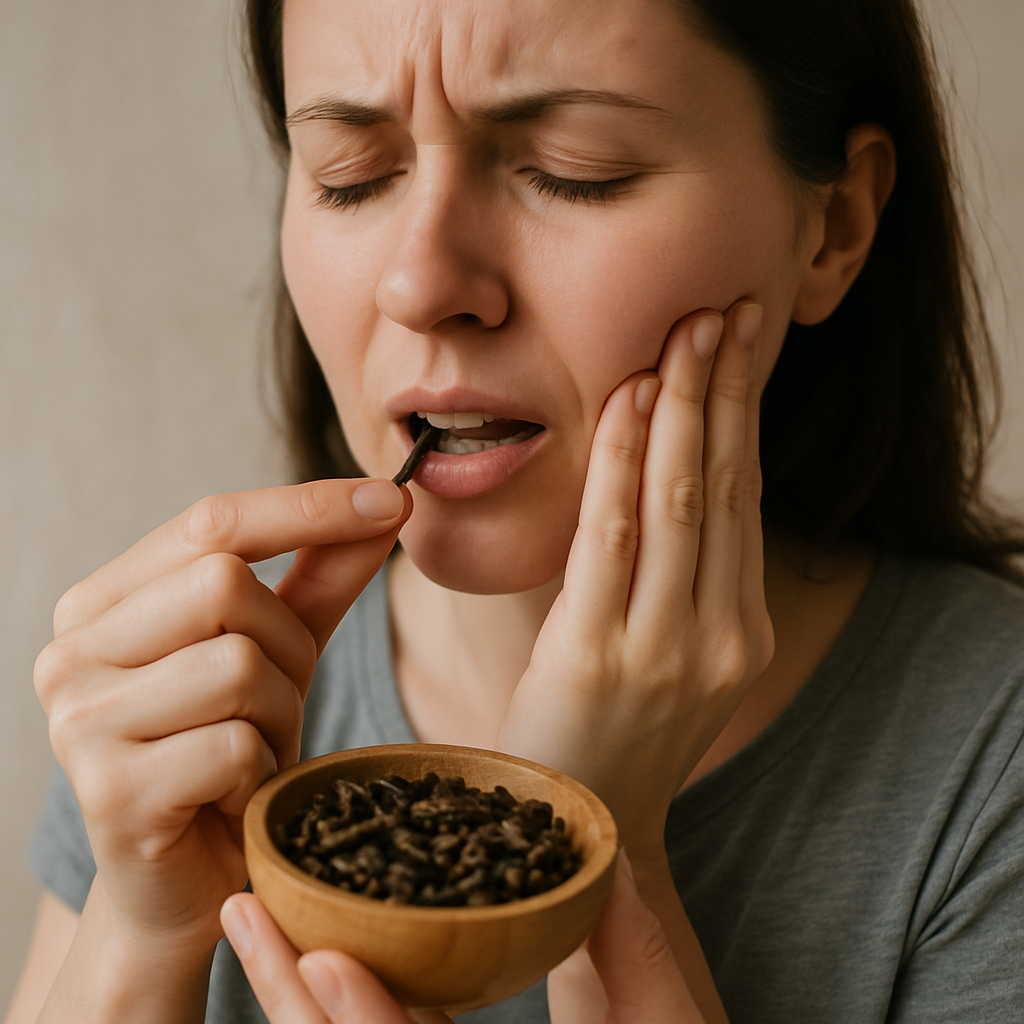Ask Ayurvedic doctor a question and get a consultation online on the problem of your concern in a free or paid mode. More than 2,000 experienced doctors work and wait for your questions on our site and help users to solve their health problems every day.
How to Use Clove for Toothache: Natural Relief for Pain

Toothaches can strike at the worst possible moments, causing discomfort that’s hard to ignore. While dental visits are essential, sometimes you need quick, natural relief right at home. That’s where clove comes in—a traditional remedy that's been used for centuries to ease tooth pain. In this article, you’ll learn how to use clove for toothache effectively, understand why it works, and discover safe ways to apply it for relief.
Clove for toothache is popular because it offers a natural, accessible alternative to over-the-counter painkillers. Keeping clove in mouth for toothache might sound simple, but knowing the right way to use it can make all the difference. Does clove help toothache? Absolutely! Clove contains eugenol, a natural compound with analgesic and antibacterial properties, making it a perfect clove treatment for toothache. Whether it’s clove oil or whole cloves, you’ll find practical advice here to tackle your teeth pain with confidence.
Why Is Clove Good for Toothache?
Clove has been used in traditional medicine for hundreds of years, especially in Ayurvedic and Chinese treatments. But what makes clove so effective for tooth pain? The secret lies in its chemical makeup. Eugenol, the active ingredient found in clove for teeth, acts as a natural anesthetic and antiseptic. This compound can numb the affected area temporarily, which helps reduce the sharp pain of an aching tooth.
Additionally, eugenol has anti-inflammatory properties that calm down swollen gums or irritated tissues around your teeth. When you apply clove on teeth or use clove oil, it penetrates the gum line and attacks bacteria that cause infection. This dual action—pain relief and antibacterial effect—makes clove remedy for toothache a go-to for many seeking quick and natural relief.

How to Use Clove for Toothache
There are several ways you can use clove for teeth pain, ranging from simply placing a whole clove in your mouth to preparing clove paste or applying clove oil directly. Here’s a breakdown of the most common and effective methods:
Keeping Clove in Mouth for Toothache
One of the simplest ways to get relief is by keeping a whole clove in your mouth, close to the aching tooth. Bite down gently on the clove to release its natural oils and let it sit there for several minutes. This direct contact allows eugenol to numb the pain and reduce swelling. But beware, don’t chew too hard or swallow the clove accidentally.
This method is handy if you don’t have clove oil but still want quick relief. The sensation might feel a bit strong or spicy at first, but it usually calms down as the clove works its magic.
Clove Oil on Aching Tooth
Clove oil is a concentrated extract and often more effective than whole cloves. To use it, soak a cotton ball or a clean piece of cloth with a few drops of clove oil and gently dab it on the aching tooth or gums. Avoid using too much oil since it’s very potent and can cause irritation if overused.
Clove oil is also useful when you want faster relief, as the concentrated eugenol penetrates deeper and numbs the area more quickly. Just be cautious around kids or pets, as clove oil should be handled carefully.
Clove Paste and Ayurvedic Applications
Another traditional approach is making a paste from ground cloves mixed with a little water or olive oil. Apply this paste directly to the painful area for a soothing effect. This clove treatment for toothache blends the benefits of clove powder with a smoother texture that can be easier to keep on the gums for longer periods.
In Ayurveda, clove paste is often used alongside other natural ingredients like turmeric or neem to boost antibacterial action, promoting faster healing.
Clove for Teeth Pain: Benefits and Effects
Clove for teeth pain isn't just an old wives’ tale—there’s plenty of science backing up its benefits. Besides numbing pain, clove’s antibacterial properties help fight infections that often cause toothaches in the first place. This means clove isn’t only masking symptoms but also addressing underlying issues, making it a truly practical home remedy.
People often ask, “how does clove reduce toothache?” The answer lies in its ability to block pain signals to the brain and reduce inflammation. The eugenol in clove interferes with pain receptors, effectively calming down the nerves in your teeth and gums. Plus, by reducing inflammation, clove decreases pressure and swelling, which are common sources of throbbing pain.
Another bonus? Clove can freshen breath and help with minor gum irritations. This makes clove on teeth a versatile treatment for overall oral comfort, not just for sharp tooth pain.
Clove Remedy Recipes for Toothache at Home
If you’re wondering how to use clove for toothache in more creative ways, there are some easy recipes you can try at home with minimal ingredients.
1. Simple Clove and Salt Paste
Mix ground cloves with a pinch of salt and a few drops of water to create a thick paste. Apply this gently to the painful tooth and surrounding gums. Salt acts as an extra antiseptic, helping to cleanse the area while clove provides pain relief.
2. Warm Clove Tea Rinse
Boil a handful of whole cloves in water, let it steep for 15 minutes, then strain. Use this warm clove tea as a mouth rinse several times a day. This helps reduce inflammation and kills bacteria that cause toothache and bad breath.
3. Clove Oil and Coconut Oil Blend
Combine a few drops of clove oil with coconut oil to dilute its strength. Apply the mixture to the painful area with a cotton swab. Coconut oil also has antibacterial properties and can soothe irritated gums.
These homemade clove remedies for toothache are simple but effective. They allow you to tailor the strength and application depending on your comfort level and severity of pain.
Safety Tips and Precautions of Using Clove for Teeth Pain
While clove is generally safe when used correctly, there are some important precautions to keep in mind. Using clove treatment for toothache improperly or too often can cause side effects or irritation.
Who Should Avoid Clove Treatment
If you have allergies to cloves or any of its components, avoid using clove for teeth pain altogether. Also, children, pregnant women, and people with sensitive gums should consult a healthcare professional before trying clove remedies.
Side Effects of Overusing Clove or Oil
Applying too much clove oil or leaving cloves in the mouth for extended periods can cause burning sensations, mouth sores, or irritation. Some people might even experience allergic reactions like swelling or rash. Also, swallowing large amounts of clove oil is toxic and must be avoided.
To be safe, always dilute clove oil if possible, use small amounts, and limit treatment sessions to no more than a few times a day. If pain persists longer than a couple of days, visit a dentist as the cause may require professional care.

How Long Does It Take for Clove to Work?
Many people wonder, “does clove help toothache instantly?” The answer isn’t exactly black and white. When you use clove oil or keep clove in mouth for toothache, relief can start within minutes, especially with clove oil’s concentrated eugenol. However, the duration and speed of relief depends on the severity of the pain and how you apply it.
For mild to moderate toothaches, you might feel numbness and pain reduction in as little as 5 to 10 minutes. Stronger pain or infections might take longer, and clove should be seen as a temporary relief rather than a cure. Remember, clove treatment for toothache works best as a supportive home remedy while you arrange to see your dentist for proper diagnosis and care.
Conclusion
Clove for toothache is a natural, time-tested remedy that can provide real relief when used properly. Whether you’re keeping clove in mouth for toothache, applying clove oil on aching tooth, or using clove paste, the key is understanding how to use it safely and effectively. Clove not only numbs pain but also helps fight infections and inflammation, making it a versatile clove treatment for toothache.
That said, clove is not a permanent fix. If your tooth pain persists or worsens, seek professional dental help immediately. But for quick, natural relief that you can try at home, clove for teeth pain is a handy and accessible option worth keeping in your natural remedy toolkit.
Feel free to share this article with friends or family who might benefit from this simple yet powerful clove remedy for toothache. Don’t forget, sometimes nature has the best answers to everyday problems!
FAQs
How to use clove oil for teeth?
Apply a few drops of clove oil to a cotton ball and gently press it against the painful tooth or gums. Avoid swallowing the oil and use sparingly to prevent irritation.
Can clove instantly relieve toothache?
Clove oil can numb pain within minutes for mild toothaches, but it’s not an instant cure. It offers temporary relief until you can see a dentist.
Can I use clove every day for tooth pain?
Using clove daily is not recommended without medical advice, as overuse can cause irritation or other side effects. Limit use to occasional pain relief and consult your dentist if pain persists.

